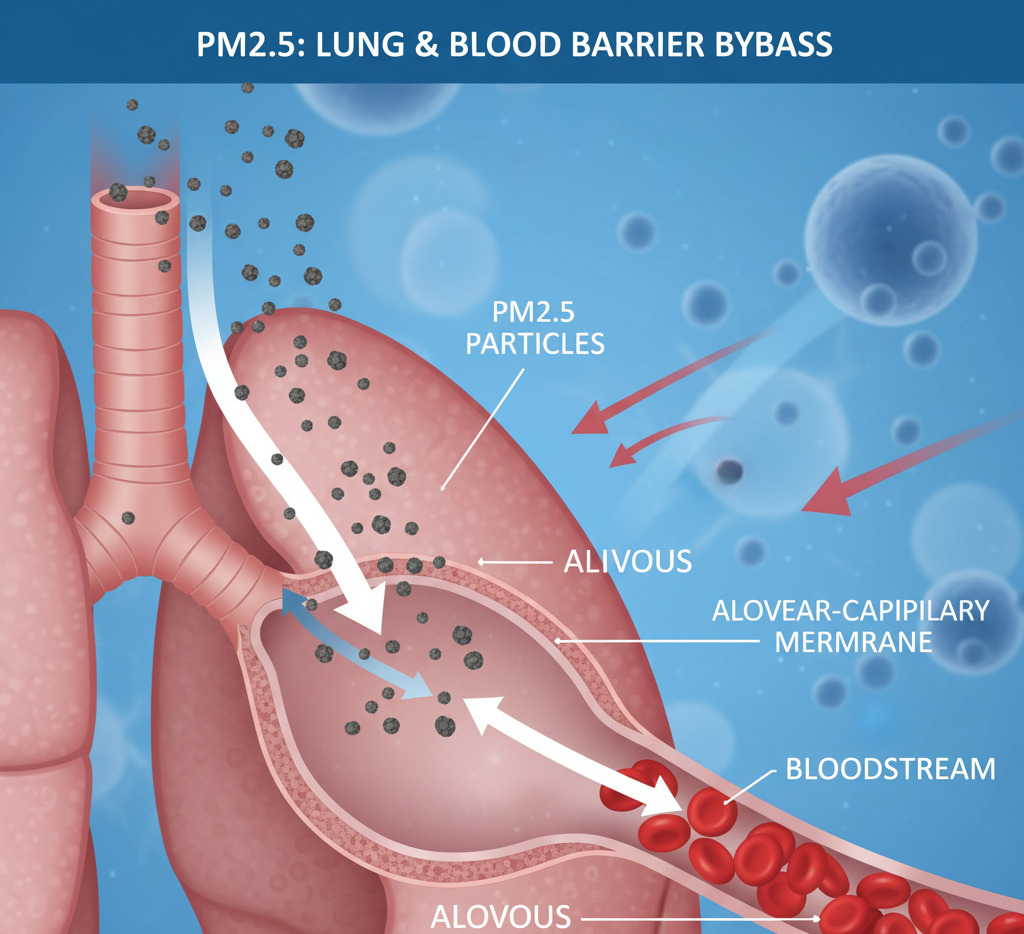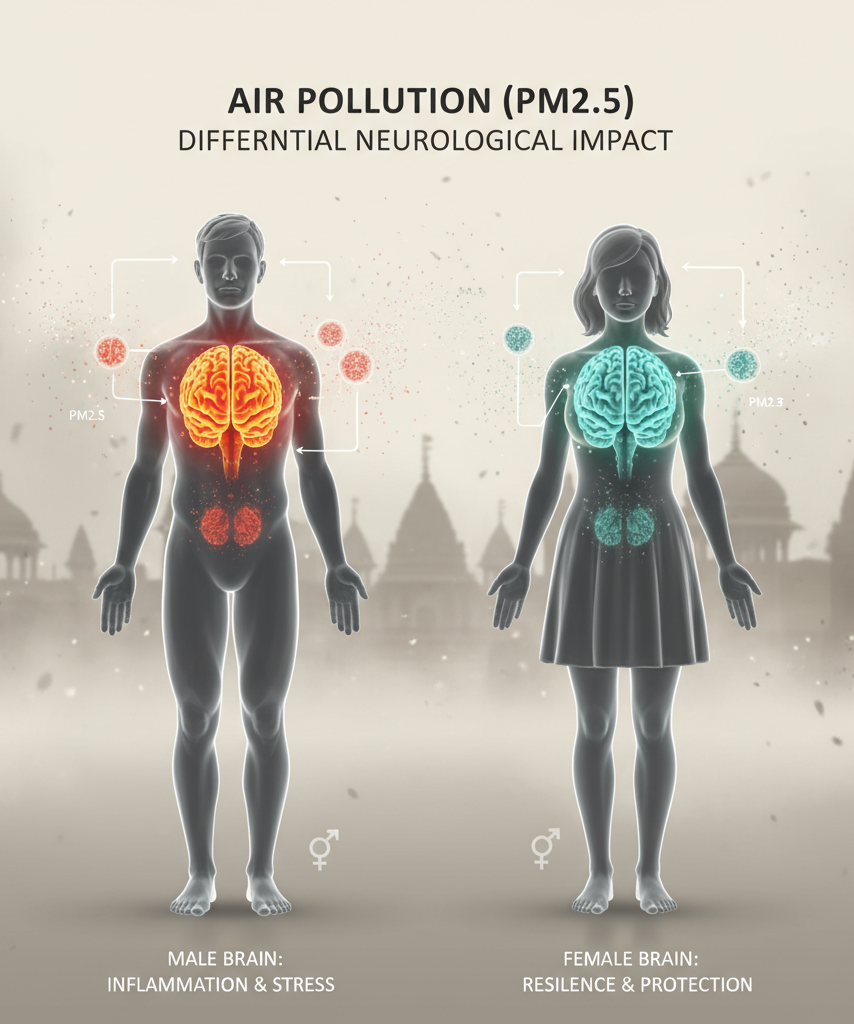Introduction: When Air Pollution Starts Affecting the Mind
In India’s crowded cities, clean air has become a luxury. The haze that blankets Delhi, Kolkata, and Mumbai isn’t just an inconvenience—it’s a silent neurotoxin. Fine particulate matter, especially PM2.5 pollution, can penetrate deep into the lungs, enter the bloodstream, and reach the brain.
Recent research reveals something fascinating and concerning: air pollution may affect men and women differently. This is known as an evolutionary sex bias in how our brains respond to new environmental stressors like PM2.5. While men may experience faster cognitive decline, women may show higher emotional sensitivity and stress reactivity. Understanding this difference could help protect millions of Indians from long-term neurological harm.

What is PM2.5 and Why is it Dangerous?
PM2.5 stands for particulate matter smaller than 2.5 micrometers—tiny enough to travel through the respiratory system and reach the bloodstream. Sources include vehicle emissions, industrial smoke, road dust, and biomass burning.
The World Health Organization (WHO) recommends that annual PM2.5 levels remain below 5 µg/m³, but Indian cities often exceed 100 µg/m³ during winter. Prolonged exposure has been linked to asthma, heart disease, and now, cognitive dysfunction.
PM2.5 is particularly dangerous because it:
-
Crosses the blood–brain barrier.
-
Triggers oxidative stress (damage from free radicals).
-
Causes neuroinflammation (brain swelling and immune activation).
-
Alters neurotransmitters responsible for mood, memory, and attention.
How PM2.5 Pollution Affects the Brain
When these fine particles enter the brain, they activate microglial cells—the immune defenders of the nervous system. Chronic activation of these cells causes inflammation and damages nearby neurons. Over time, this leads to slower thinking, memory lapses, and even neurodegenerative diseases like Alzheimer’s and Parkinson’s.
PM2.5 also affects blood vessels, reducing oxygen supply to brain tissue. Reduced blood flow can cause mini-strokes or vascular dementia, especially in older adults. In children, exposure during early brain development can delay speech, attention, and learning skills.
The Concept of Evolutionary Sex Bias
Men and women evolved under different survival pressures, shaping their hormonal and neurological systems in unique ways. These differences influence how each sex responds to environmental stressors like pollution.
-
Estrogen, the female sex hormone, acts as a natural antioxidant, protecting neurons from oxidative stress.
-
Testosterone, while beneficial for muscle and aggression-related functions, offers less neuroprotection and may enhance stress-linked pathways.
-
Women tend to have better antioxidant defense mechanisms, while men may have higher vulnerability to inflammation-induced neural damage.
This creates an evolutionary bias—where male brains might suffer quicker cognitive deterioration under chronic PM2.5 exposure, and female brains might show higher emotional dysregulation and anxiety.

Differences in Cognitive Response Between Men and Women
Male Brain Response:
Men exposed to long-term air pollution show reduced attention span, working memory loss, and slower problem-solving ability. Neuroimaging studies reveal thinning in the prefrontal cortex—an area responsible for planning and reasoning.
Female Brain Response:
Women may experience mood-related disturbances like irritability, anxiety, and emotional fatigue. The hippocampus, which controls emotion and memory, appears more sensitive to environmental toxins in females.
Children and Adolescents:
Young brains are more plastic, meaning more vulnerable. Girls exposed to high PM2.5 levels may develop slower language skills, while boys may exhibit reduced impulse control or hyperactivity.
Mental and Neurological Conditions Linked to PM2.5
-
Cognitive decline and dementia
-
Depression and anxiety disorders
-
Alzheimer’s and Parkinson’s disease
-
Attention deficit and hyperactivity in children
-
Sleep disturbance and chronic fatigue
-
Reduced IQ and learning potential
These outcomes are influenced by both biological sex and duration of exposure, making gender-specific prevention vital.
ALSO READ: Foods That Help You Sleep Better Naturally
Diagnosis and Evaluation
Doctors may recommend a combination of tests for individuals exposed to polluted environments:
-
Cognitive tests to assess memory and attention.
-
Brain imaging (MRI, PET) to detect inflammation or degeneration.
-
Blood tests for oxidative stress markers and inflammatory proteins.
-
Air quality monitoring devices for home and workplace use.
Treatment and Management
There is no specific “pollution pill,” but a combination of lifestyle and medical interventions can protect your brain.
-
Antioxidant-rich diet: Eat foods high in Vitamin C (amla, oranges), Vitamin E (nuts, seeds), and Omega-3 (flaxseeds, fish).
-
Exercise: Aerobic activity boosts oxygen circulation and enhances brain resilience.
-
Air purification: Install HEPA filters and use air quality apps to plan outdoor activities.
-
Stress management: Yoga, meditation, and pranayama improve oxygen flow and mental clarity.
-
Medical care: If you notice chronic headaches, memory loss, or emotional changes, visit a general physician or neurologist through Quickobook for assessment.

Prevention and Lifestyle Changes
-
Check AQI (Air Quality Index) daily. Avoid outdoor exercise when levels are high.
-
Use N95 masks during travel or in industrial areas.
-
Keep your home ventilated but clean; avoid incense smoke and kerosene stoves.
-
Plant air-purifying greens like Tulsi, Areca Palm, and Money Plant.
-
Stay hydrated and get regular health checkups.
When to See a Doctor
Consult a healthcare provider if you experience:
-
Constant fatigue or mental fog
-
Poor concentration or memory lapses
-
Headaches that worsen with outdoor exposure
-
Sleep disturbances or mood swings
-
Signs of depression or anxiety
Early diagnosis and intervention reduce long-term brain damage.
Risks and Long-Term Complications
Prolonged exposure to PM2.5 pollution may lead to:
-
Chronic neurological disorders
-
Hormonal imbalance and stress sensitivity
-
Early-onset dementia
-
Decline in academic or work performance
-
Mental health challenges due to emotional instability
Conclusion
Air pollution is no longer just an environmental issue—it’s a neurological emergency. The discovery of evolutionary sex bias in cognitive response to PM2.5 pollution reveals that men and women are affected differently at the brain level.
Protecting brain health requires awareness, lifestyle adjustments, and community-level interventions. Clean air should be treated as a public health right, not a luxury.
If you live in a polluted city and experience fatigue, poor focus, or mood changes, consult a doctor through Quickobook for timely evaluation and brain health support.
Quickobook Call-to-Action
Book your consultation today on Quickobook to connect with top general physicians, neurologists, and environmental health experts in your city. Quickobook helps you book appointments, teleconsult safely, and access verified doctors near you — all in one place.
50 FAQs: PM2.5, Brain, and Sex Differences
-
What is PM2.5 pollution?
PM2.5 refers to fine airborne particles smaller than 2.5 micrometers that can travel deep into the lungs and bloodstream, affecting multiple organs. -
How does PM2.5 affect the brain?
It crosses the blood–brain barrier and causes inflammation, oxidative stress, and damage to neurons, leading to cognitive decline. -
Why does air pollution affect men and women differently?
Because of hormonal and genetic differences that alter how male and female brains respond to stress and toxins. -
Does estrogen protect the brain from pollution?
Yes. Estrogen has antioxidant properties that reduce oxidative damage and support neuron repair. -
Can PM2.5 cause depression?
Yes, chronic exposure disrupts serotonin and dopamine balance, increasing the risk of depression and anxiety. -
How is cognitive decline tested?
Through standardized neurocognitive assessments, memory tests, and imaging studies like MRI. -
Is brain damage from PM2.5 reversible?
Mild damage can improve with reduced exposure, antioxidants, and lifestyle changes, but severe cases may persist. -
Can children be more affected?
Yes, developing brains are highly sensitive to pollutants, which can delay learning and attention development. -
How does air quality affect mental health?
Polluted air raises stress hormone levels, leading to fatigue, irritability, and poor emotional regulation. -
What are symptoms of pollution-related brain issues?
Common signs include headaches, memory problems, difficulty focusing, and disturbed sleep. -
Can antioxidants reduce the effects of pollution?
Yes, antioxidants like vitamins C and E help neutralize free radicals and protect brain cells. -
Is there a safe level of PM2.5?
No level is completely safe, but WHO recommends staying below 5 µg/m³ for minimal risk. -
Can PM2.5 increase dementia risk?
Yes, several studies link high PM2.5 exposure to early-onset dementia and Alzheimer’s disease. -
Do men lose memory faster due to pollution?
Men may show quicker memory decline because of weaker antioxidant defenses and higher oxidative stress. -
Are women more prone to anxiety from PM2.5?
Yes, female brains are more reactive in emotional centers like the amygdala when exposed to pollution stress. -
Can pregnant women be affected by PM2.5?
Yes, it can impact fetal brain development and increase the risk of low birth weight or neurodevelopmental delay. -
Does PM2.5 affect hormonal balance?
Yes, pollutants can interfere with endocrine function, indirectly influencing brain and mood. -
What foods help protect the brain from PM2.5 damage?
Fruits, nuts, green leafy vegetables, and omega-3–rich foods like fish and flaxseeds support brain defense. -
Does exercise help reverse PM2.5 effects?
Regular exercise improves blood flow and boosts antioxidant levels, countering pollution-related brain stress. -
Can indoor air also cause brain problems?
Yes, indoor pollutants from cooking smoke or incense can contribute to similar oxidative effects. -
Is PM2.5 exposure worse in winter?
Yes, lower temperatures trap pollutants near the ground, increasing concentration and health risk. -
Can PM2.5 cause headaches?
Yes, poor air quality often triggers headaches and migraines due to reduced oxygen flow to the brain. -
Does PM2.5 affect learning in children?
Yes, long-term exposure is linked to slower learning, lower IQ, and behavioral issues. -
How can I check PM2.5 levels in my area?
Use air-quality apps like SAFAR, AQI India, or government dashboards for real-time data. -
Does using an air purifier help?
Yes, HEPA filters effectively remove PM2.5 and reduce respiratory and cognitive risks indoors. -
Can pollution affect sleep?
Yes, air toxins can irritate nasal passages and disrupt the brain’s sleep–wake rhythm. -
How does PM2.5 cause oxidative stress?
It generates free radicals that damage DNA, proteins, and cell membranes in brain tissue. -
Can the brain detox naturally from pollution?
To some extent, yes. Adequate sleep, hydration, and a nutrient-rich diet support the brain’s detox systems. -
Are older adults more vulnerable?
Yes, aging brains have reduced antioxidant capacity, making them more prone to cognitive decline. -
Can PM2.5 lead to stroke?
Yes, it damages blood vessels and increases the risk of clot formation and stroke. -
Does PM2.5 affect decision-making ability?
Chronic exposure can impair the prefrontal cortex, reducing focus and judgment. -
Are rural areas safer from PM2.5?
Usually yes, but crop burning, dust storms, and biomass fuels can still raise local PM2.5 levels. -
Can PM2.5 exposure affect fertility?
Yes, it can influence hormonal balance and sperm/egg quality in both sexes. -
How can workplaces reduce PM2.5 exposure?
Using air filtration, maintaining ventilation, and installing green plants help lower levels. -
Is cognitive decline from PM2.5 permanent?
It can be slowed or partially reversed through treatment and healthy lifestyle interventions. -
Does gender affect recovery from pollution-related damage?
Yes, females may recover faster due to hormonal protection, while males show slower repair rates. -
Can vitamins help protect brain function?
Yes, vitamins B12, C, and E strengthen neural health and lower oxidative stress. -
Do masks really prevent PM2.5 exposure?
N95 masks can block up to 95% of fine particles when worn properly. -
Can meditation help brain recovery?
Yes, it improves oxygenation and reduces inflammation markers in the brain. -
Does PM2.5 affect academic performance?
Children in polluted areas often score lower in memory and attention-based tests. -
Can PM2.5 increase anxiety levels?
Yes, it disrupts brain chemicals that regulate mood and calmness. -
Is PM2.5 linked to Alzheimer’s disease?
Yes, chronic exposure is associated with beta-amyloid buildup seen in Alzheimer’s brains. -
Can PM2.5 cause vision or hearing problems?
Indirectly, yes—it affects circulation and inflammation that may impact sensory nerves. -
Does living near traffic worsen brain health?
Yes, vehicle exhaust is one of the biggest sources of PM2.5 neurotoxins. -
Can reducing pollution exposure improve memory?
Yes, studies show that moving to cleaner environments enhances attention and memory scores. -
Is PM2.5 more dangerous than PM10?
Yes, PM2.5 particles are smaller and penetrate deeper into the body, causing greater harm. -
Can air pollution shorten lifespan?
Yes, long-term exposure can reduce life expectancy by several years due to heart and brain diseases. -
Do air-purifying plants really help?
Yes, indoor plants like Snake Plant, Money Plant, and Areca Palm improve air quality modestly. -
Can PM2.5 affect emotions and relationships?
Yes, chronic exposure can heighten irritability, anxiety, and reduce emotional control. -
What’s the best way to protect brain health from pollution?
Maintain a clean environment, eat antioxidant-rich foods, exercise regularly, and consult your doctor through Quickobook for preventive brain care.









Comments (0)
No comments yet. Be the first to share your thoughts!
Leave a Comment